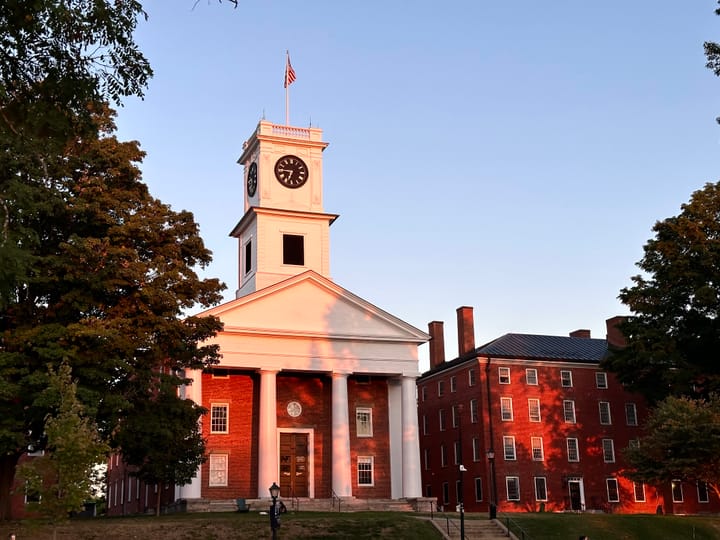In Contentious Debate, AAS Approves Purchase Of Senate Sweatshirts
In a close vote, the AAS Senate approved the purchase of sweatshirts for senators at their weekly meeting on Dec. 6. Senators’ debate over the purchase went beyond its constitutionality to questions surrounding ethical uses of student funds and appropriate compensation of senators.

In a tight vote on Monday night, Dec. 6, 55 percent of the Association of Amherst Students (AAS) voted in favor of purchasing 50 quarter-zip sweatshirts, 35 for AAS senators and the remaining 15 to be designated as prizes for any Amherst student to win. The closeness of the vote is a product of several threads of disagreement among student government members on both the specific features of this sweatshirt purchase and the overarching role of AAS within the student body.
The proposal to purchase the sweatshirts was initially put forth by Lorett Alarcon ’24 at the AAS’s Nov. 15 meeting. At the time the proposal was first made, it was understood that if the purchase was approved, it would be funded through the Senate Fund, a specially allocated pocket of AAS money designated for the Senate to use as it sees fit with no restrictions.
The Senate Fund comes from the general pool of AAS funds, which are collected from each student via the student activities fee. Though there are no limits as to how senators choose to use it, it is typically used to finance Senate projects that aim to benefit the entire Amherst community. Money from the fund, however, has historically also been allocated to put on a Senate formal.
The quarter-zips, a heather gray design with a purple AAS seal in the upper left chest area, cost $61 each and totaled just over $3,083.
When Alarcon originally brought up the idea on Nov. 15, senators had mixed reactions. The disagreement ultimately led the senate to table the proposal until they finally voted this past Monday.
Some senators support the effort as a way to reward senators for their public service to the Amherst community, make senators more visible on campus, and incentivize joining the AAS. Yvette Kiptoo ’23 was cited in the Nov. 15 meeting minutes saying that jackets “would be good to have” given the senators’ uncompensated hard work.
The minutes also mentioned Jaden Richards ’25, who “said that a good way to get people involved in the Senate was to have an incentive, such as very nice jackets. He said that if the money was not being used and most Senators were OK with it, they should put the money to use.”
Sydney Ireland ’23, according to the minutes, noted that these sweatshirts “would serve as an identifier to make [senators] more recognizable to the student body.”
In an interview with The Student, Alarcon stressed that the point of the sweatshirts is “representing AAS and encouraging people to run and get the word out. It’s like advertising for [AAS]. We do so much for the community and the school… and I just want people to know about who we are and since I feel like a lot of people don’t have that information, it’s necessary that we have something to unify us.”
“If you see someone wearing this sweatshirt, you know they’re a part of student government and if you have a concern you want to bring up, you can talk to them,” Alarcon continued.
Cole Graber-Mitchell ’22, who voted against the motion on Dec. 6, expressed in the Nov. 15 meeting that he “felt a little uncomfortable spending [more than] $2,000 for jackets for themselves as they did not allow clubs to do the same thing.” The rule Graber-Mitchell is referring to is the Budgetary Committee’s (BC) policy to not recommend funding for “giveaways” like merchandise or apparel for registered student organizations (RSO).
Treasurer Jae Yun Ham ’22, who leads BC meetings and did not have a vote in this sweatshirt proposal, explained, “Let’s say Mock Trial [hypothetically] wants to get shirts that say ‘Mock Trial.’ We don’t think that meaningfully engages the student body.”
Ham noted that AAS is an exception given that it is not technically an RSO and that it can use the Senate Fund. He explained that, for example, The Student, though it is also not an RSO, would not get funded for sweatshirts: “I guess the thing that differentiates the Senate is that we have access to the Senate Fund. The Student does not have access to the Senate Fund.”
Beyond the constitutionality of the purchase, Ham also bolstered some of the sentiments of senators, noting that AAS members are not compensated for their public service. “Some senators work really, really hard — they’re in that meeting for like three hours every week,” Ham said. Still, he mentioned that if the AAS was considered a regular RSO, “We would never have funded this and I would have put my foot down.”
Jalen Woodard ’23, an AAS senator who voted in favor of buying the sweatshirts, noted the imbalance in the no-giveaway item policy between the AAS and RSOs. In an email interview, he said, “I understood the concerns on the other side about fairness … With over half a million dollars in the AAS bank account, perhaps BC should reevaluate that policy, if that’s what our constituents want. I’m sure there is a fiscally responsible way to go about it.”
Although the sweatshirt purchase technically doesn’t violate any AAS policies, some senators were left with ethical qualms. Graber-Mitchell told The Student, “I think this is really about what we should do rather than whether or not we can do something.”
Graber-Mitchell commended the reasons his fellow senators had to justify the sweatshirt purchase. He agrees that incentivizing participation and making AAS more visible are all valiant goals, but could be achieved with a much smaller expense (like a $10 jacket) that could come from the senators’ pockets.
Sirus Wheaton ’23 also voted against the sweatshirts, agreeing that there are more effective ways to achieve the stated aims, for example, “if the AAS Instagram was more active or if there were times where the senators … were doing events that help the whole school community.”
I think getting a $60 jacket, or even a $10 jacket, doesn’t really make sense to me,” Wheaton said.
As for using the sweatshirts as a reward for AAS service, Wheaton expressed that he would rather be fairly compensated for his work. He said, “I feel like the conversation that we should be having with the administration is not to give us a $62 jacket, but rather to say, ‘Shouldn’t we compensate these people?’... I don’t want my compensation to be a jacket.”
Meanwhile, Woodard saw the sweatshirts as a sufficient, more cost-efficient stand-in for compensation. He wrote in an email, “Many comparable student governments have begun paying members of their executive and legislative bodies, but of course that would likely require raising the student activities fee.”
Ultimately, Graber-Mitchell still acknowledges that this purchase is within the constitutional bounds of AAS’s funding powers. He expanded, “The more interesting thing is whether or not we should be doing this, whether or not this is an appropriate use of student funds to buy ourselves jackets. We can talk all day about whether AAS is exclusionary, but it’s undeniably true that this purchase is designed to give jackets to 35 people and maybe 15 others, and not the rest of the student body.”





Comments ()